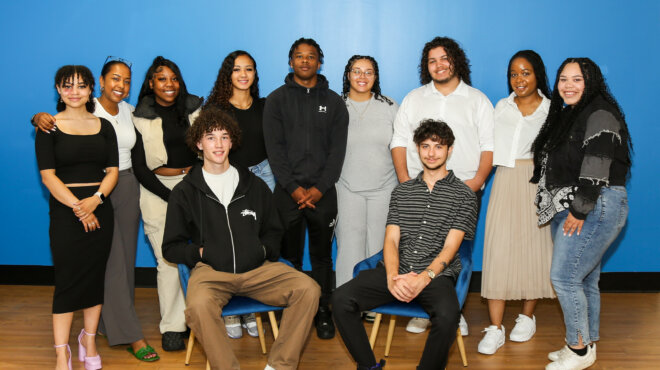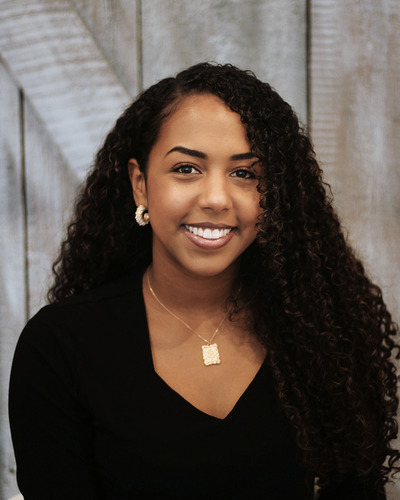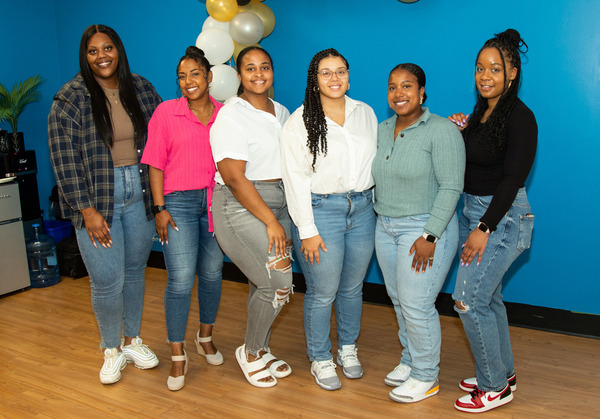
Ashley Hill PREPs African Nova Scotian students for success
After overcoming significant challenges as a first-year Dal student, Ashley Hill now runs the PREP Academy. There, she leads a team supporting African Nova Scotian students who may feel similarly bewildered and out-of-place when first entering a post-secondary setting.
By Emily MacKinnon
When an honours high school student starts university, everyone expects they will do well. But as Ashley Hill (BA’13) found out, the path to success seems only to be paved for some.
Hill’s post-secondary journey started the way it does for many students: she enrolled in standard first-year courses like macroeconomics and psychology. The trouble was, she was unfamiliar with the subjects and struggled to engage.
It wasn’t just the course material she had a hard time adjusting to. Hill was suddenly in much larger classes than she’d had in high school. The classes were filled with students who didn’t look like her. They had laptops and appeared to already know when and how to take notes. Everyone else seemed to understand the expectations around required readings.
Hill was caught off guard; no one had prepared her for the culture and pace of university. As the first person in her immediate family who would go on to graduate university, she had no one to turn to for guidance. “It feels like you’re lost in a current and you’re just being knocked around, swept in whatever direction, because no one taught you how to swim at that level and speed,” Hill says.
After a year of struggling, Hill received a letter suggesting she leave the program and come back when she was better equipped to handle the workload.
She had been academically dismissed.
Receiving proper support
A family friend soon connected Hill with Quenta Adams (BA’93), who was then Director, Advising and Access Services and is now Assistant Vice-Provost of Student Engagement and Success at Dal. Adams is one of the Dal alumni helping shape Dal’s African Nova Scotian Strategy and raising awareness of supports like Dal’s Transition Year Program and Black Student Advising Centre.
“Once I got connected with Quenta, I never left,” Hill recalls. “She was my lifeboat.”

Ashley Hill, founder and executive director of the PREP Academy.
Adams helped Hill make a plan. They got Hill re-admitted. They mapped the rest of her degree, making sure she had the tools and support she needed to succeed. “My first step is to always have students tell me their story, to build that relationship,” Adams says. She is careful not to steer students explicitly, but to gently guide them and help them figure out their own path. “The students have the tools. They just may not necessarily be sure how to unpack them or how to use them.”
It was exactly the type of individualized attention Hill had been missing. But Hill knew it could have been even more impactful if she had received it before starting university in the first place.
It got her thinking about current African Nova Scotian high school students, and how she could help them avoid a first year like hers. “If I got a job at a university as a Black Student Advisor, I’d only get to support students who make it there,” Hill says. “I knew I wanted to do something within the public school system.”
The PREP Academy was born.
Prepping for PREP
The PREP Academy, founded by Hill in April 2021, is a community-based non-profit that inspires and prepares African Nova Scotian high school students to pursue their chosen form of post-secondary education.

Ashley Hill, second from left, and some of her staff members at PREP Academy in Dartmouth.
In addition to helping students in Grades 10, 11 and 12 plan, prepare and transition into college or university, PREP also provides culturally relevant support as students navigate a new educational environment. There’s a strong focus on building tailored plans built on personal connections — something Hill says was intentional.
“I wanted to design something that was relationship-based because I so valued the lifeboat-relationship that Quenta was for me,” Hill says. “I wanted to have lifeboats for other students. But in a way where we’re swimming together, versus me just saving them.”
In addition to post-secondary preparation, PREP introduces students to career mentors, and job shadowing and networking opportunities. Whatever students say they need, Hill and her team pivot to meet.
“Our goal isn’t to hurry students along and move them into institutions,” she says, “but rather give them the skills to make informed decisions and to think for themselves.”
Related reading:
- Dal’s African-Nova Scotian Strategy
- Dal’s Transition Year Program
- PREP signs MOU with King’s College
Learning to fail successfully
Hill is generous with her experience. She shares it openly, so students see someone who has failed successfully. She hopes they will learn that it’s okay to try different things until they find the right fit. “You can get kicked out,” she says with a smile. “You can fail, and they’ll still want to do an alumni spotlight on you.” Hill also volunteered to be a panelist at a Dalhousie Promise Scholars lecture offered in the Faculty of Management in 2022 called Embracing Diversity: Black Women Build Businesses.
Adams says that in the 10 years since Hill’s graduation, Dalhousie has evolved its supports. The advice is not as prescriptive as it once was, and she hopes it will “lessen and remove” experiences like Hill’s.
The future of PREP
The first cohort of PREP students is entering their second year of college or university. Hill is proud to see how far they’ve come. And as the students grow, so does PREP.
“I have an amazing team who goes out there every day and makes magic and believes in something that I’ve developed and created,” Hill says. “I’m really grateful for that, and for our team.”